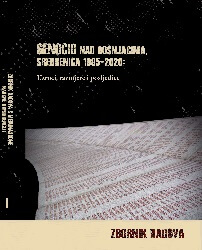Genocid u Srebrenici kao najviši oblik terorizma nad Bošnjacima
Genocide in Srebrenica as the Highest Form of Terrorism against Bosniaks
Author(s): Vahid Karavelić
Subject(s): Local History / Microhistory, Political history, Criminology, Studies in violence and power, Victimology, Transformation Period (1990 - 2010), Geopolitics
Published by: Institut za istraživanje zločina protiv čovječnosti i međunarodnog prava Univerziteta u Sarajevu
Keywords: terrorism; genocide; Bosnia and Herzegovina; Srebrenica; state terrorism; international terrorism; aggression; geopolitics;
Summary/Abstract: Terrorism is one of the social phenomena that threaten the security of states and societies. It is one of the components of war (armed) conflicts. It is a common case that a certain terrorist act was the reason for war and war destruction. The consequences produced by terrorist acts and terrorism include, among others, the commission of numerous individual and mass forms of crimes against humanity and international law, including the crime of genocide. Bosnia and Herzegovina has experienced such fate. There are few places in the world with such a rich history of violence and acts of terror as that of Bosnia and Herzegovina. The latest aggression against the Republic of Bosnia and Herzegovina resulted in series of crimes against humanity and international law, including the crime of genocide, both in Srebrenica and in all occupied towns and cities under siege. In this context, the analysis of the content of relevant documentation will draw parallels, connections and relations between terrorism and genocide committed in the Republic of Bosnia and Herzegovina. It will be shown that terrorism (and terrorism) and genocide are phenomena that accompany each other and are an inseparable part of war conflicts, since terrorism has become one of the main features of modern ways and methods of warfare.
- Page Range: 973-984
- Page Count: 12
- Publication Year: 2021
- Language: Bosnian
- Content File-PDF

